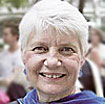Commentary on Isaiah 35:1-10
This text shouldn’t be here.
Amid rumors of war and desolation, Isaiah 35 surprises us. A voice speaks without addressing anyone by name, without the particularity of time. This poem follows another poem filled with ecological destruction: “The streams of Edom shall be turned into pitch, and her soil into sulfur; her land shall become burning pitch…Thorns shall grow over its strongholds, nettles and thistles in its fortresses.”
Then, without a break and without explanation, Isaiah 35 interrupts devastation and despair:
The wilderness and the dry
land shall be glad.
the desert shall rejoice and
blossom;
like the crocus it shall blossom
abundantly,
and rejoice with joy and
singing…
How can we help people see this word?
Perhaps you can place a long blue cloth running down into the aisle from the communion table — a river in the sanctuary. Can you see people fishing in the Hudson River from the pier on 125th Street in Harlem?
Can you see the vacant lot in the Bronx once strewn with broken bottles and crack vials? Now it’s a community garden. Look at the rows of string beans and beets! Young kids and grandmothers are weeding together.
What can you see where you live — in nearby farms or city streets?
Some say this hopeful promise belongs to Second Isaiah. Others argue that it comes even later — sixth century BCE or later still — surely after the exile. This poem comes too early. Who moved it? Some things even our best scholarship cannot explain. The Spirit hovered over the text and over the scribes: “Put it here,” breathed the Spirit, “before anyone is ready. Interrupt the narrative of despair.” So, here it is: a word that couldn’t wait until it might make more sense.
Some people will hear the recitative from The Messiah in Isaiah’s promise of restoration for those with disabilities:“Then shall the eyes of the blind be open-ed and the ears of the deaf unstop-ped…” How do these promises sound to people who live with disabilities?
Perhaps you can create a Call to Worship or post-communion litany that offers a different vision:
Then the blind woman and her dog
shall process with the choir;
the deaf man who sees what we often miss
shall paint the text on the sanctuary walls;
the veteran in the wheelchair
shall break the bread of life,
and the homeless man who cannot speak
shall sign the hymns for everyone to see.
For many years Chuck Campbell taught preaching at Columbia Seminary in Decatur, Georgia. He required students in one of his classes to lead worship and preach at the Open Door Shelter for homeless people in downtown Atlanta. One day he was leading worship in front of the shelter, amid the noise of rush-hour traffic. After the call to worship and a song, Chuck’s plans were interrupted. “I noticed one homeless man waving to me and pointing to himself. I was surprised when I saw him for the man can neither hear nor speak and is normally very reserved.
But there he was, eager to do something. He stepped into the middle of the circle, bowed his head in silence, and began to sign a hymn for us. It was beautiful, like a dance… In that moment our notions of ‘abled’ and ‘disabled’ were turned upside down. The rest of us had been shouting to be heard, but the noise was no problem for our friend…Our worship became a token of the resurrection in the midst of the powers of death, a glimpse of God’s beloved community.” Even Isaiah couldn’t have imagined the glory of that moment in downtown Atlanta as the hands of the speechless were singing for joy!1
Isaiah dares to speak a word out of place. A word that refused to wait until things improved. As Walter Bruggemann has reminded us, “Israel’s doxologies are characteristically against the data.” We see and hear the data every night on the news and every morning on the front page of the paper. Add to that the data of our own lives: waiting for the test results from the doctor, mourning the death of a loved one, wondering if we’ll make it through the next round of lay-offs. We know the data all too well and we long for a word out of place.
Who will speak a word out of place? Marian Wright Edelman, founder and president of the Children’s Defense Fund often speaks such a word. She refuses to wait until the time is right and everyone is on her side. After the latest defeat of a gun control measure, she wrote: “I woke up the morning after the Senate vote thinking about Sojourner Truth, one of my role models, a brilliant and indomitable slave woman who could neither read nor write but who was passionate about ending unjust slavery and second-class treatment of women. At the end of one of her antislavery talks in Ohio, a man came up to her and said, “Old woman, do you think that your talk about slavery does any good? Do you suppose people care what you say? Why, I don’t care any more for your talk than I do for the bite of a flea.”
“Perhaps not,” she answered, “but, the Lord willing, I’ll keep you scratching.”
Then Marian goes on in her own words: “We must be determined and persistent fleas…Enough fleas biting strategically can make the biggest dog uncomfortable. And if they flick some of us off but even more of us keep coming back with our calls, emails, visits, nonviolent direct action protests, and votes — we’ll win.”2
Who will speak a word out of place? A homeless deaf man in downtown Atlanta. An advocate for children who refuses to be silent. A prophet who couldn’t wait until the hopeful Part 2 of Isaiah 40-55. He spoke a word out of place. This is exactly the word many people are yearning to hear.
O come now, living water, pour your grace,
And bring new life to ev’ry withered place;
Speak comfort to each trembling heart:
“Be strong! Fear not, for I will ne’er depart.”
Rejoice, rejoice! Take heart and do not fear,
God’s chosen one, Immanuel, draws near.
—
1 Charles L. Campbell, The Word before the Powers: An Ethic of Preaching (Louisville: Westminster John Knox Press, 2002), 123-124.
2 Marian Wright Edelman, “We Must Never Give Up,” Child Watch Column, April 20, 2013.


December 15, 2013